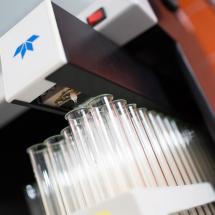
|
Drugs and Biomaterials (FCT)
Doctoral Programme,
Faculty of Chemical Technology
The Drugs and Biomaterials study programme focuses mainly on the fields of medicinal chemistry, drug analysis and the study of the structures of solid pharmaceuticals, research about and study of the properties of inorganic and polymeric materials for biomedical applications, pharmaceutical process engineering, and applied informatics for the pharmaceutical industry. CareersGraduates of this programme will be qualified for employment at universities, Czech Academy of Sciences institutes, and research and technology centres in the Czech Republic and abroad, mainly in the areas of basic and applied research of drugs and pharmaceutical forms, pharmaceutical technologies and biomaterials. Further employment opportunities for graduates are additionally to be found at R&D institutes, in analytical and control laboratories for industrial companies in these fields, and in public (governmental) administrative units, including professional R&D management positions. Programme Details
|
You are here: UCT Prague → Web PhD → Prospective doctoral candidates → Study Programmes and PhD Topics → Programme detail
Updated: 20.1.2022 16:26, Author: Jan Kříž

